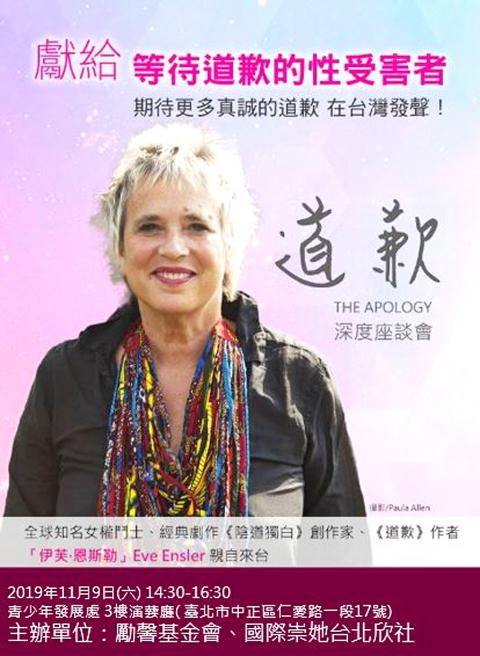Over the past week, some of the world’s leading gender equality activists have gathered in Kaohsiung for the World Conference of Women’s Shelters. This weekend, two of them will have public engagements in Taipei.
Tomorrow at 2:30pm, Eve Ensler, the American writer and activist best-known for her play The Vagina Monologues, will lead a discussion on her latest book, The Apology.
The memoir takes the form of an imagined letter to Ensler from her late father, who physically and sexually abused her as a child. It has been hailed as a “blueprint of contrition” for perpetrators.

Photo courtesy of The Garden of Hope Foundation
The discussion is hosted by The Garden of Hope Foundation, an NGO that runs women’s shelters, counseling programs and campaigns for gender equality. Admission is free, although donations are appreciated.
Tomorrow at 7pm, Nina Smart, an American sociologist, will give a talk exploring the role of female genital mutilation (FGM) in West African culture and solutions to end the practice.
After escaping FGM while growing up in Sierra Leone, Smart went on to write a memoir and found an NGO to raise awareness about the practice. Her talk is organized by the Taiwan Coalition Against Violence, and admission is NT$200.

Photo courtesy of The Garden of Hope Foundation
■ Eve Ensler’s book discussion is tomorrow, 2:30pm at the third floor auditorium of the Taipei City Youth Development Office, 17, Renai Rd Sec 1, Taipei City (臺北市仁愛路1段17號 ). Register at: reurl.cc/5gvl7G
■ Nina Smart’s talk is tomorrow, 7pm at Brilliant Time bookstore (燦爛時光), 1, Lane 135, Xingnan S Rd Sec 1, New Taipei City (新北市興南路一段135巷1號 )

US President Donald Trump may have hoped for an impromptu talk with his old friend Kim Jong-un during a recent trip to Asia, but analysts say the increasingly emboldened North Korean despot had few good reasons to join the photo-op. Trump sent repeated overtures to Kim during his barnstorming tour of Asia, saying he was “100 percent” open to a meeting and even bucking decades of US policy by conceding that North Korea was “sort of a nuclear power.” But Pyongyang kept mum on the invitation, instead firing off missiles and sending its foreign minister to Russia and Belarus, with whom it

When Taiwan was battered by storms this summer, the only crumb of comfort I could take was knowing that some advice I’d drafted several weeks earlier had been correct. Regarding the Southern Cross-Island Highway (南橫公路), a spectacular high-elevation route connecting Taiwan’s southwest with the country’s southeast, I’d written: “The precarious existence of this road cannot be overstated; those hoping to drive or ride all the way across should have a backup plan.” As this article was going to press, the middle section of the highway, between Meishankou (梅山口) in Kaohsiung and Siangyang (向陽) in Taitung County, was still closed to outsiders

President William Lai (賴清德) has championed Taiwan as an “AI Island” — an artificial intelligence (AI) hub powering the global tech economy. But without major shifts in talent, funding and strategic direction, this vision risks becoming a static fortress: indispensable, yet immobile and vulnerable. It’s time to reframe Taiwan’s ambition. Time to move from a resource-rich AI island to an AI Armada. Why change metaphors? Because choosing the right metaphor shapes both understanding and strategy. The “AI Island” frames our national ambition as a static fortress that, while valuable, is still vulnerable and reactive. Shifting our metaphor to an “AI Armada”

The Chinese Communist Party (CCP) has a dystopian, radical and dangerous conception of itself. Few are aware of this very fundamental difference between how they view power and how the rest of the world does. Even those of us who have lived in China sometimes fall back into the trap of viewing it through the lens of the power relationships common throughout the rest of the world, instead of understanding the CCP as it conceives of itself. Broadly speaking, the concepts of the people, race, culture, civilization, nation, government and religion are separate, though often overlapping and intertwined. A government